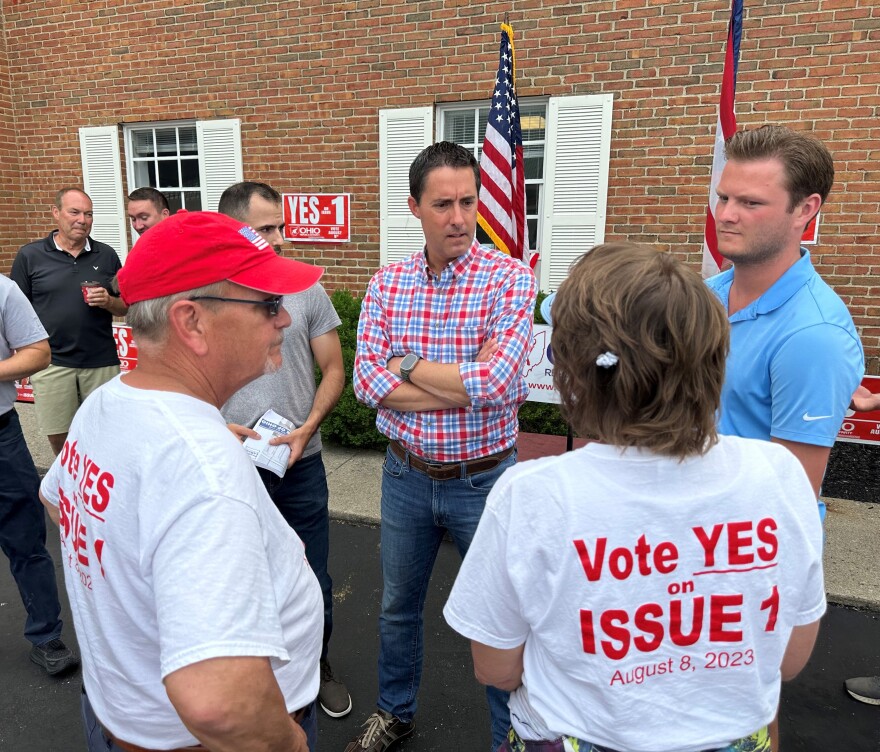The Libertarian Party of Ohio has filed a complaint claiming Republican Ohio Secretary of State Frank LaRose is violating the federal law that bars state officials from using their official authority to interfere with elections.
Saying he’s breaking federal law, the Libertarian Party of Ohio has filed a complaint with the U.S. Office of Special Counsel against LaRose. At issue is the Hatch Act, which regulates the political activities of public officials.
LaRose has been outspoken in the party’s efforts to convince Ohio voters to approve Issue 1. That question on the Aug. 8 special election ballot would make it harder to pass future constitutional amendments by requiring a 60% passage threshold instead of a simple majority. It’s before voters months ahead of an abortion access and reproductive rights amendment on the November ballot.
Travis Irvine, communications director for the Libertarian Party of Ohio, said LaRose is in clear violation of the Hatch Act, a federal law that governs political activity by federal and some state employees.
“The problem is Ohio Secretary of State Frank LaRose is receiving federal funds to administer elections in the state of Ohio and in doing so, he basically cannot affect an election himself as a public official,” Irvine said. “And therein lies the problem - with Frank LaRose going out there campaigning in favor of Issue 1 while supposedly having to be an impartial election administrator.”
Issue 1 is the only question on the Aug. 8 special election ballot.
Related: Ohio voter guide: What to know about the August special election
Last year, LaRose led a charge for HB 458, a law to get rid of most August special elections.
But lawmakers pushed for the vote before a reproductive rights amendment in the fall. Republican lawmakers, including LaRose, have said the change is about abortion, but have also recently added that it goes beyond that.
The Ohio Supreme Court ruled the law didn’t apply to state lawmakers putting amendments before voters in August special elections.
In addition to pro-Issue 1 campaign events, LaRose challenged his opponents in the Republican race for U.S. Senate next year to donate to the campaign. LaRose called for Sen. Matt Dolan (R-Chagrin Falls) and Northeast Ohio car dealer Bernie Moreno to pony up $1 million each to the fight for Issue 1.
Moreno's campaign said he's already given six figures to the campaign and offered to match LaRose's donations dollar-for-dollar. LaRose's campaign responded by saying he is not as wealthy as his opponents and has put "sweat equity" into the campaign by appearing at more than 60 pro-Issue 1 events.
LaRose's campaign issued a statement calling the Libertarian Party’s complaint "a cheap publicity stunt by Frank’s political opponents."
"They know he’s making great progress in convincing Ohioans to vote yes on Issue 1, and they’re trying to intimidate him. Frank isn’t one to back down from a fight," the LaRose for U.S. Senate campaign said.
The complaint includes concerns raised by Irvine a decade ago when LaRose, then a Republican state senator, voted in favor of SB 193, a law that had the effect of limiting power of minor parties such as the Libertarian Party of Ohio. Irvine, who ran unsuccessfully for governor in 2018, said LaRose will do what it takes to get ahead.
“‘Two-faced Frank’ needs to be called out and that’s what we are doing,” Irvine said.
Issue 1 would not only raise the voter approval threshold for future constitutional amendments to 60%, it would also make it harder for groups to qualify for the ballot.
It would require signatures from all 88 counties, as opposed to 44 now. It would also eliminate the 10-day “cure period” that allows organizers to gather additional signatures if they fall short of the needed total.




